
TUESDAY, SEPT 17, 2019

As Society Unravels
The Future Is Up for Grabs
by Jeremy Lent
TOPICS: JEREMY LENT, FROM THE WIRES, ISSUES
Abstract: As I vet Jeremy Lent as a person of interest who knows enough to have an opinion, to merit consideration, ‘a careful hearing’, I followed up on a mass email to supporters today (9/17/19). After reading a few paragraphs I copied the text to allow comments [to be added] as such thoughts as are occasioned that differ from the narrative offered may well be wrong. Noting such differences is worth doing as Lent has better things to do than correcting me. Differences made explicit can be better questioned. I would not do this for an article written by Guy McPherson (among others) as I vet him to not be a credible source, even if he knows stuff.
COOS BAY (A-P) — Jeremy Lent's missive, [with comments in brackets]:
As Society Unravels, the Future Is Up for Grabs
As civilization faces an existential crisis, our leaders demonstrate their inability to respond. Theory of change shows that now is the time for radically new ideas to transform society before it’s too late. [Leaders react in severely constrained ways that excludes ‘foresight intelligence’ or ecolacy (systems science literacy). Could world leaders end all fossil fuel use in five years and collapse the global economy and food production system (and population of humans, pets, and livestock) or do anything to prevent Naure from doing so? No. But a ‘teachable moment’ is foreseeable.]
Of all the terrifying news bombarding us from the burning of the Amazon, perhaps the most disturbing was the offer of $22 million made by France’s President Emmanuel Macron and other G7 leaders to help Brazil put the fires out. Why is that? The answer can help to hone in on the true structural changes needed to avert civilizational collapse. [The idea that global collapse of complex society, i.e. the Euro-Sino Empire, can be averted is assumed by ‘Plan A’ thinking. Understanding that global complex society as the whole shebang is unable to avert descent/dissolution leads to Plan B thinking. To turn things around before hitting the wall of biophysical limits while in free fall is Plan A. Preserving ‘pockets of sustainability’, enclaves of functional complex society able to preserve information and to rebuild after collapse is Plan B. This fork in the road is crucial, so if: ‘1. Our global economic system is NOT REMOTELY CLOSE TO SUSTAINABLE. 2. We are captured and being dragged along by a complex, powerful and remorseless dynamic that automatically thwarts all attempts to stop it. 3. If we don’t put time and energy into understanding it, we are doomed to go with it, right to the final curtain’, then Plan B becomes relevant, thinkable. But given that all conjectures may be wrong, Plan A is not excluded.]
Scientists have publicly warned that, at the current rate of deforestation, the Amazon is getting dangerously close to a die-back scenario, after which it will be gone forever, turned into sparse savanna. Quite apart from the fact that this would be the greatest human-made ecological catastrophe in history, it would also further accelerate a climate cataclysm, as one of the world’s great carbon sinks would convert overnight to a major carbon emitter, with reinforcing feedback effects causing even more extreme global heating, ultimately threatening the continued existence of our current civilization. [Turning the Amazon into cattle production to supply McDonald’s et al. with hamburger meat to meet consumer demand is the BAU dynamic driving the mass extermination event. Climate change will add to, is not the cause, of the event, and politicizing it is a distraction from the fact that those dependent on industrial society are all ‘Anthropocene enthusiasts’ even if some number themselves among the least enthusiastic, e.g. XR supporters.]
Macron and the other leaders meeting in late August in Biarritz were well aware of these facts. And yet, in the face of this impending disaster, these supposed leaders of the free world, representing over half the economic wealth of all humanity, offered a paltry $22 million—less than Americans spend on popcorn in a single day. By way of context, global fossil fuel subsidies (much of it from G7 members) total roughly $5.2 trillion annually—over two hundred thousand times the amount offered to help Brazil fight the Amazon fires. [Pre-’teachable moment’ BAU and any ‘leader’ who is not ‘onboard’ self-selects out of the social control system just as any CEO who works to give investors a negative return on investment is replaced.]
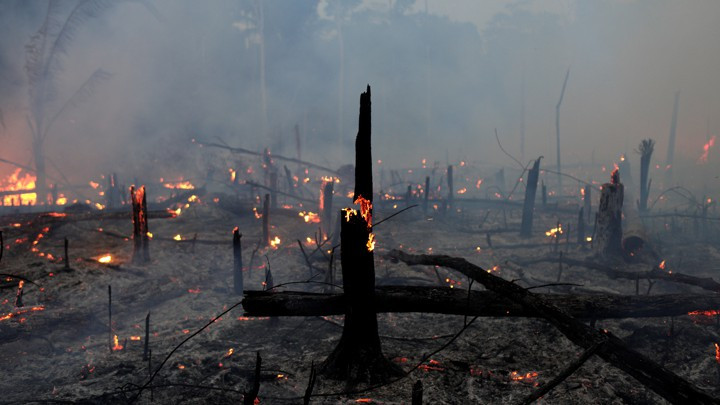
The Amazon is burning, while our global leaders do nothing. (Reuters/Ricardo Moraes)
Brazil’s brutal president Bolsonaro is emerging as one of the worst perpetrators of ecocide in the modern world, but it’s difficult to criticize his immediate rejection of an amount that is, at best a pittance, at worst an insult. True to form, Donald Trump didn’t bother to turn up for the discussion on the Amazon fires, but it hardly made a difference. The ultimate message from the rest of the G7 nations was they were utterly unable, or unwilling, to lift a finger to help prevent the looming existential crisis facing our civilization. [Brazil provides nearly 20 percent of total global beef exports and is the largest exporter in the world (India being number 2, Australia 3, and USA 4 who is #1 largest producer/consumer of beef), and we are all part of the remorseless dynamic including enthusiastic XR supporters.]
Why Aren’t They Doing Anything?
This should not be news to anyone following the unfolding twin disasters of climate breakdown and ecological collapse. It’s easy enough to be horrified at Bolsonaro’s brazenness, encouraging lawless ranchers to burn down the Amazon rainforest to clear land for soybean plantations and cattle grazing, but the subtler, and far more powerful, forces driving us to the precipice come from the Global North. It’s the global appetite for beef consumption that lures Brazil’s farmers to devastate one of the world’s most precious treasure troves of biodiversity. It’s the global demand for fossil fuels that rewards oil companies for the wanton destruction of pristine forest. [Pays them to turn fossil fuel into food along with everything else that can be produced/consumed by people like me.]
There is no clearer evidence of the Global North’s hypocrisy in this regard than the sad story of Ecuador’s Yasuní initiative. In 2007, Ecuador’s president, Rafael Correa proposed an indefinite ban on oil exploration in the pristine Yasuní National Park—representing 20% of the nation’s oil deposits—as long as the developed world would contribute half the cost that Ecuador faced by foregoing oil revenues. Initially, wealthier countries announced their support for this visionary plan, and a UN-administered fund was established. However, after six years of strenuous effort, Ecuador had received just 0.37% of the fund’s target. With sorrow, the government announced it would allow oil drilling to begin. [You can’t fight city hall, growth, short-termism, i.e. the BAU dynamic that we are all captured and being dragged along by.]

The
Yasuni National Park is now open to oil exploration, following the
Global North’s inaction.
(Audubon/Neil Ever Osborne)
The simple lesson is that our global leaders currently have no intention to make even the feeblest steps toward changing the underlying drivers of our society’s self-destruction. [They may or may not have every intent, but what they intend doesn't matter. They can’t change the 'rules of the game' while being part of the system that selects for compliance.] They are merely marching in lockstep to the true forces propelling our global civilization: the transnational corporations [and mercantile interests going back to East India Company of 1600 and Hudson Bay Company of 1670 on back to before Athenian colonization of Mediterranean followed by the Romans who…] that control virtually every aspect of economic activity. These, in turn, are driven by the requirement to relentlessly increase shareholder value at all cost [any CEO or shareholder who thinks otherwise is replaced], which they do by turning the living Earth into a resource for reckless exploitation, and conditioning people everywhere to become zombie consumers. [Which accounts for the pervasiveness of we Anthropocene enthusiasts.]
This global system of unregulated neoliberal capitalism was unleashed in full fury by the free market credo of Ronald Reagan and Margaret Thatcher in the 1980s, and has since become the underlying substrate of our politics, culture, and economics [during the exuberance of growth phase capitalism grew the economy fastest]. The system’s true cruelty, destructiveness, and suicidal negligence [pursuit of short-term self interests] are now showing themselves in the unraveling of our world order [our extreme affluence], as manifested in the most extreme inequality in history, the polarized intolerance of political discourse, the rise in desperate climate refugees, and a natural world that is burning up, melting down, and has already lost most of its nonhuman inhabitants. [Understand the dynamic as there are no political solutions.]
How Change Happens
Studies of past civilizations show that all the major criteria that predictably lead to civilizational collapse are currently confronting us: climate change, environmental degradation, rising inequality, and escalation in societal complexity. As societies begin to unravel, they have to keep running faster and faster to remain in the same place, until finally an unexpected shock arrives and the whole edifice disintegrates. [Tainter et al.]
It’s a terrifying scenario, but understanding its dynamics enables us to have a greater impact on what actually happens than we may realize [i.e. maybe our only hope]. Scientists have studied the life cycles of all kinds of complex systems—ranging in size from single cells to vast ecosystems, and back in time all the way to earlier mass extinctions—and have derived a general theory of change called the Adaptive Cycle model. This model works equally well for human systems such as industries, markets, and societies. As a rule, complex systems pass through a life cycle consisting of four phases: a rapid growth phase when those employing innovative strategies can exploit new opportunities; a more stable conservation phase, dominated by long-established relationships that gradually become increasingly brittle and resistant to change; a release phase, which might be a collapse, characterized by chaos and uncertainty; and finally, a reorganization phase during which small, seemingly insignificant forces can drastically change the future of the new cycle.
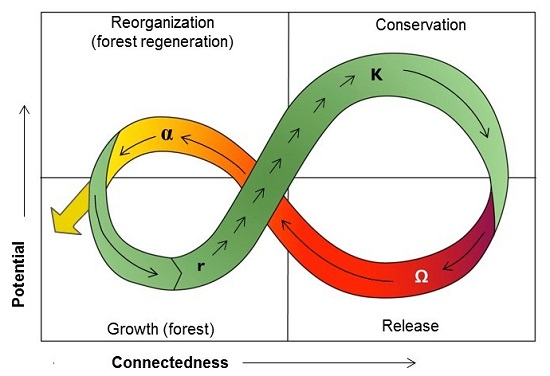
The Adaptive Cycle model of change
[Following images added]
A better view: the Maladaptive Cycle.
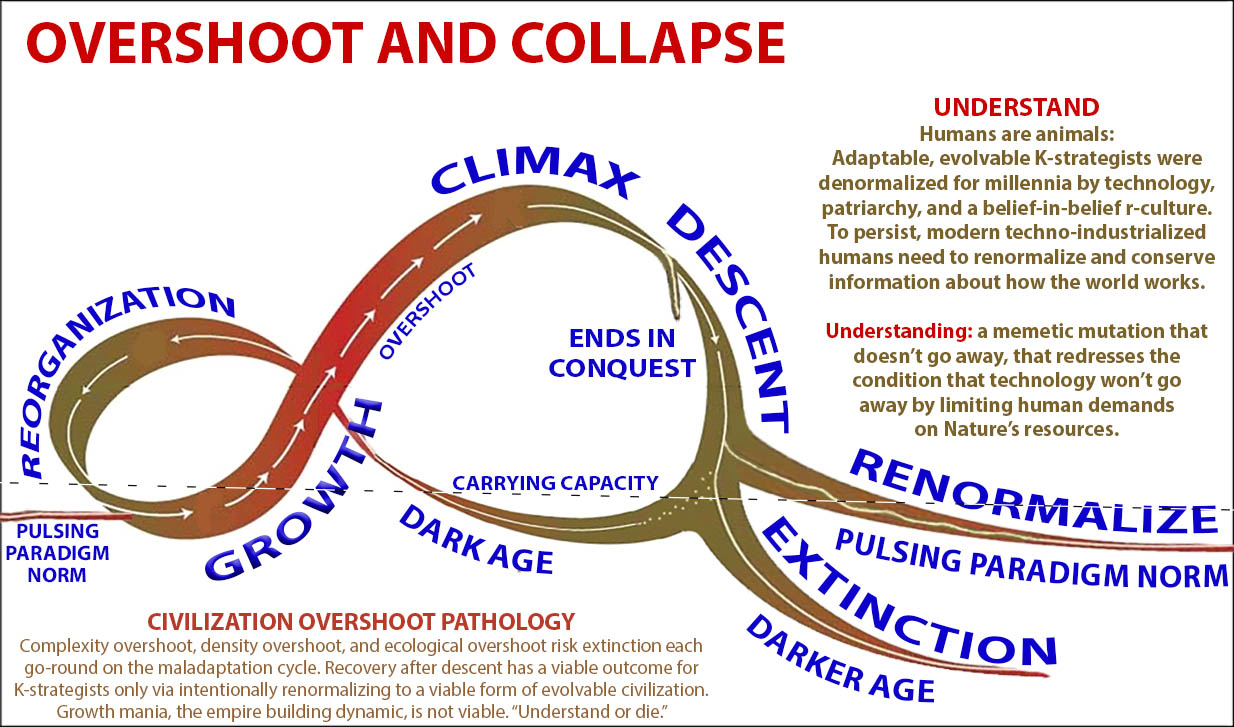
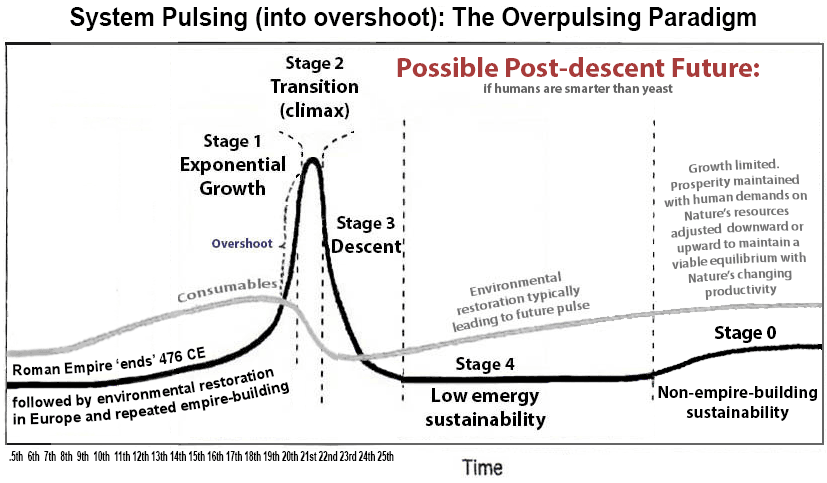
Alternative is the pulsing paradigm which is the norm when pulsing within boundaries when growth, for a time, is good.
Overpulsing is common which involves pulsing outside of boundaries (e.g. carrying capacity) with foreseeable outcome.
Stage 0 would pulse
in response to varying environmental productivity, but as a managed commons not going above carrying capacity.]
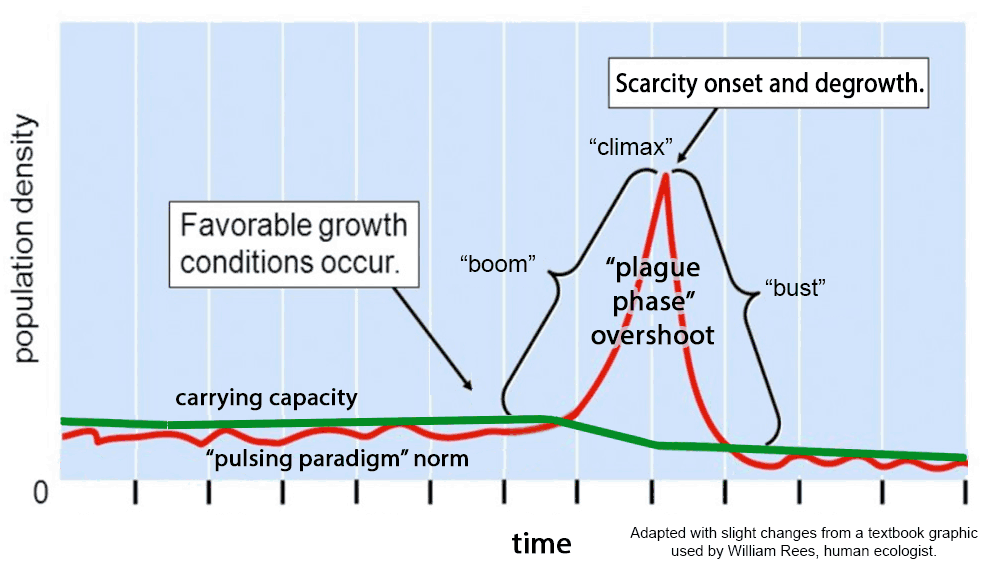
Right now, many people might agree that our global civilization is at the late stage of its conservation phase, and in many segments, it feels like it’s already entering the chaotic release phase. [Many 'might agree' but are focusing on regional areas of descent and are in error. The global system (population, affluence and technology) is still growing (driving species extinction and climate change) and many people might agree that we haven’t entered the conservation (or climax) phase of the pulsing paradigm yet.]
This is a crucially important moment in the system’s life cycle for those who wish to change the predominant order. As long as the conservation phase remains stable, new ideas can barely make an impact on the established, tightly connected dominant ecosystem of power, relationships, and narrative. However, as things begin to unravel, we see increasing numbers of people begin to question foundational elements of neoliberal capitalism: an economy based on perpetual growth, seeing nature as a resource to plunder, and the pursuit of material wealth as paramount. [From the POV of those ‘running the show’, the elites who falsely think that they are running the show and that the rest of us mistakenly agree are (with an insignificant number of exceptions), ‘we’ elites have not transitioned from the growth phase into the climax phase yet or we are in early transition now in some regions and some areas are in descent, e.g. South Sudan, Syria, Venezuela (the correct view). We won’t know when the system climaxed overall (>50%) until after the fact when descent can no longer be denied, which is the ‘teachable moment’. In Lent’s view we are transitioning into descent. Climax is likely to be relatively brief, and that we are transitioning into it is not an extraordinary claim (China’s growth is down to only 5%, so they are only doubling their economy every 14 years instead of every 7-10 years, but 5% still looks like growth to me. Globally ‘we’ haven’t climaxed yet, much less are we in free fall yet. Given that there is no limit to the rate of descent, we could climax the system in 2020 and be extinct by 2026 just as Guy McPherson says we will be. My guess is that the teachable moment won’t come until the majority of intelligentsia types have reached the top of Mt. Denial and are looking over the precipice. But extinction by 2026 is looking better, so I’d believe it if I could.]
This
is the time when new ideas can have an outsize impact. Innovative
policy ideas previously considered unthinkable begin to enter the
domain of mainstream political discourse (known as the Overton
window).
We see signs of this in the United States in the form of the Green
New Deal, or Elizabeth Warren’s plan to hold
corporations accountable.
We also see it, disturbingly, in dark political forces such as the UK
Brexit fiasco and the increasing acceptability of malevolent racist
rhetoric around the world. [No
one (Left,
Middle, Right) can think about ‘real solutions’, e.g. rapid depopulation
and ending fossil fuel, or
otherwise ‘seek
out the condition now that will come anyway’. Abandoning techno-industrial society, destroying it thereby, to form pockets of apoltical naturocracy is unthinkable, and mainstream, social, or alternative media (Ahmed, Lent) will not discourse on 'new ideas' that are outside the current climate of public opinion yet. In the Middle Ages areligious thinking was unthinkable as is apolitical thinking today. Image added:]
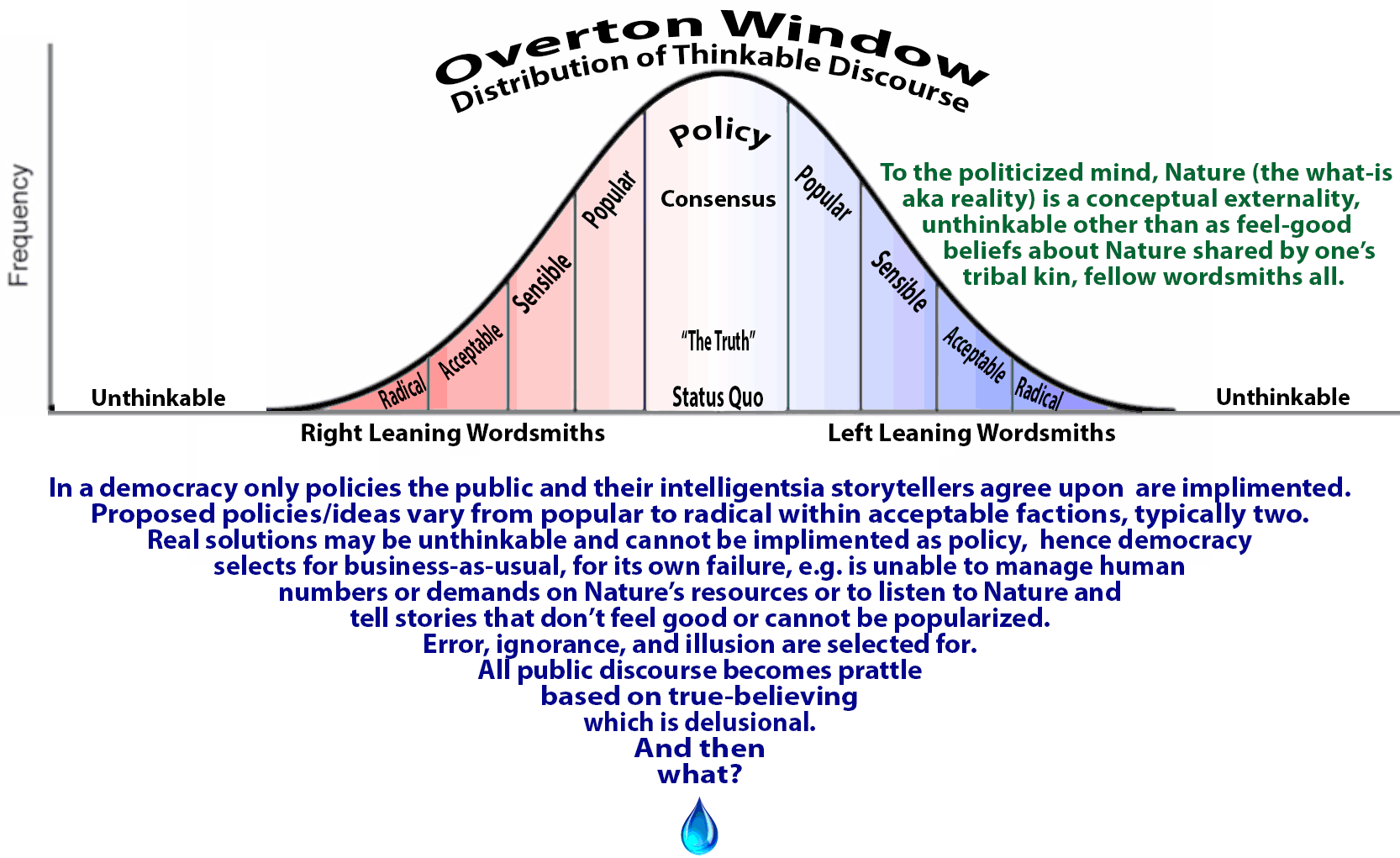
The stakes are always at their highest when both the economic and cultural norms of a society begin to fall apart in tandem. When Europe underwent a phase of collapse and renewal in the early twentieth-century, after the devastation of World War I, it became fertile terrain for the hate-filled ideologies of Fascism and Nazism that led to the dark abyss of genocide and concentration camps. The ensuing catastrophe of World War II led to another collapse and renewal cycle, this one providing the platform for the current globalized world order that is now entering the final stages of its own life cycle. [Some were starting to look over an apparent precipice in the early 1930s which was the beginnings of a 'teachable moment' when Technocracy was thinking new thoughts that could have become thinkable to enough if the cause of the brief descent (Great Depression) had been biophysical. Post-WWII growth 'saved' us again (to continue our taking of the planet), but fortunately it won't in the 21st century as the cause will be biophysical and a 90% descent will be curative.]
Shifting the Overton Window
What will emerge from the current slide into ecological and political chaos? Will the twin dark forces of billionaires’ wealth and xenophobic nationalism lead us into another abyss? Or can we somehow transform our global society peacefully into a fundamentally different system—one that affirms life rather than material wealth as paramount? [Or perhaps get one percent to vote with their feet and form pockets of sustainable complex society based on fundamentally different 'rules of the game'.]
One thing is clear: the visionary ideas that will determine the shape of our future will not be based on incremental thinking within the confines of our current system. Achieving needed reforms within the current global power structure is a worthwhile goal, but is not sufficient to lead [some of?] humanity to a thriving future. For that, we need bold, new ways of structuring our civilization, and of rethinking the human relationship with the natural world. We need to be ready to restructure the legal basis of corporations to serve humanity rather than faceless shareholders. We need global laws that force ecocidal thugs like Bolsonaro to face justice for their crimes against nature. [We need to just say no to democracy and embrace naturocracy.]
You won’t currently find these new ways of thinking in the mainstream media, nor in the speeches of politicians trying to get elected. But you will find them in the streets. You’ll find them in the courage of a Greta Thunberg: a solitary teenage girl sitting for days in front of her parliament, who has since inspired millions of schoolchildren to strike for their future. You’ll find them in the demands of the Extinction Rebellion movement, which calls for elected leaders to tell the truth about our ecological and climate crisis, and to empower citizen’s assemblies to develop truly meaningful solutions. [An Open Letter to Greta Thunberg with notes to XR. If only new ways that feel good are considered by consumers, or can be, and then what?]

The Extinction Rebellion movement calls for a meaningful response to our ecological crisis
[Earth Day 1970 involved 20 million, 1 percent of the US population ‘taking to the streets’ to call for a meaningful response to our ecological crisis. I was there and am still here. Meanwhile, the pace of planetary destruction has not slowed. Oh, but this time….]
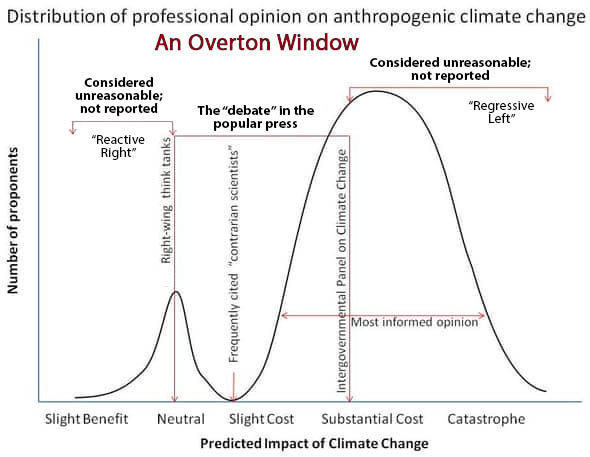 The
changes needed for a hopeful future will not come about from our
current leaders, which is why all of us who care for future
generations and for the richness of life on Earth, must take the
leadership role in their place. We need to shift the Overton window
until it centers on the real issues that will determine our future.
On September 20, three days before the UN Climate Summit in New York,
millions of young people and adults will participate in a Global
Climate Strike,
taking to the streets to demand the transformative action that’s
necessary to stave off ecological and civilizational collapse.
Actions are being planned in over a thousand cities around the world,
for what may turn out to be the single biggest coordinated grassroots
global demonstration in history. [When
one percent of the population anywhere renounces their Anthropocene
Enthusiasm in some measurable way (or
when Rev. Billy’s followers stop shopping in some measurable
way), then I’ll
probably hear about it.]
The
changes needed for a hopeful future will not come about from our
current leaders, which is why all of us who care for future
generations and for the richness of life on Earth, must take the
leadership role in their place. We need to shift the Overton window
until it centers on the real issues that will determine our future.
On September 20, three days before the UN Climate Summit in New York,
millions of young people and adults will participate in a Global
Climate Strike,
taking to the streets to demand the transformative action that’s
necessary to stave off ecological and civilizational collapse.
Actions are being planned in over a thousand cities around the world,
for what may turn out to be the single biggest coordinated grassroots
global demonstration in history. [When
one percent of the population anywhere renounces their Anthropocene
Enthusiasm in some measurable way (or
when Rev. Billy’s followers stop shopping in some measurable
way), then I’ll
probably hear about it.]
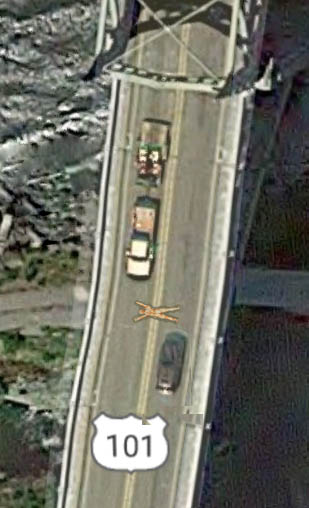 The
stakes have never been higher: the threat of catastrophe never more
dreadful; and the path to societal transformation never so apparent.
Which future are you steering us to? There’s no opting out:
anyone with an inkling of what’s happening around the world,
but who does nothing about it, is implicitly adding their momentum
toward the abyss of collapse. [Appeal to conscience, e.g. Prohibition
which won via majority rule, but....] I hope you join us on September
20 in helping steer our civilization toward a path of future
flourishing. [There is an old two-way interstate highway bridge
nearby I could block with my naked body superglued across the middle (even though I am NOT middle of the road)
and maybe block both lanes, or with a drone I could force the closure
of the regional airport. And why shouldn’t I? Oh, because doing
so is unlikely to destroy techno-industrial society ASAP, which is
what matters.]
The
stakes have never been higher: the threat of catastrophe never more
dreadful; and the path to societal transformation never so apparent.
Which future are you steering us to? There’s no opting out:
anyone with an inkling of what’s happening around the world,
but who does nothing about it, is implicitly adding their momentum
toward the abyss of collapse. [Appeal to conscience, e.g. Prohibition
which won via majority rule, but....] I hope you join us on September
20 in helping steer our civilization toward a path of future
flourishing. [There is an old two-way interstate highway bridge
nearby I could block with my naked body superglued across the middle (even though I am NOT middle of the road)
and maybe block both lanes, or with a drone I could force the closure
of the regional airport. And why shouldn’t I? Oh, because doing
so is unlikely to destroy techno-industrial society ASAP, which is
what matters.]
Jeremy Lent is author of The Patterning Instinct: A Cultural History of Humanity’s Search for Meaning, which investigates how different cultures have made sense of the universe and how their underlying values have changed the course of history. He is founder of the nonprofit Liology Institute, dedicated to fostering a sustainable worldview. For more information visit jeremylent.com.
[As I read the above I right clicked on all links to open in a new tab, then at the end I considered each link, which I will omitt providing feedback on. I provide the feedback I continue to hope to be gifted to those who will not Like what I offer anymore than I would their feedback. But I'd rather know than believe, and Nature, being unkind, doesn't care what I Like. Anyone who cares what other people think must consider any idea (e.g. 'real solution') outside the Overton window to be toxic and to be ignored, ridiculed, marginalized, obfuscated, denied, and if necessary the messenger must be vilified, demonized, imprisoned, then killed in roughly that order, and this dynamic appears to include systems thinkers like Ahmed and Lent. So far I've merely succeeded in being ignored.
I have existential concerns for humanity and the biosphere. Ahmed and Lent have…. I endeavor to think in systems, so does Lent. The common ground seems mountainous and vast, but while I don’t exclude Plan A thinking, nor would I suggest it is incompatible with also considering a Plan B, I don’t see any possibility for turning the current hegemon into its opposite, as do others, likely Lent, but the implications of this remain unthinkable to anyone who cares what other people think. That may be a confession of some limitation I have, but believing the current whole shebang will transition to its opposite, unlike all prior ones, is belief-based, faith-based, and I don't/can't do that, which is a limitation. If you view the future as ‘terrifying’ then you are merely inviting your amygdala to hijack your prefrontal cortex as usual. That’s more of concern to me than that everyone is going to die. I’m going to die. How you die (e.g. in your sleep, eaten in Zombie Apocalypse) is not as important as whether you lived a life-driven purposeful life which we don't get to define, sorry about that wordsmiths—so sad, too bad (or not), but Nature is unkind. All that I have to offer is unpopular, unlike everyone with a following, even Guy McPherson whose followers inhale his doomerism to fill them—thrill them with fantastic terrors never felt before. No one who wants a following (to save the world) or who is determined to save the world can do other than dismiss me as a know-nothing who just doesn't get it, which is what I am. Unfortunately that doesn't mean I'm wrong or 'not ever wrong'. I have no fear of futurity. I live on an Abundant Earth even if we of the present are in overshoot for a time. The truth ceases to seem strange once you get used to it. Scaring people or yourself into 'action' is the ‘doomer dynamic’ you can hear in the streets, which didn’t work in all prior complex societies. Hu-mans awake.]
